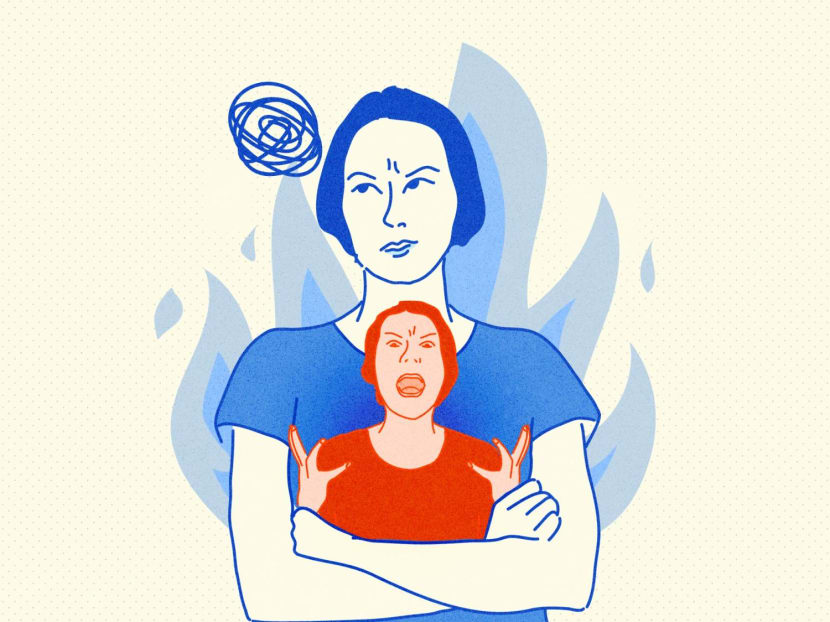Gen Zen: I didn't know I was angry until I took an anger management workshop. Here’s how I learnt to keep my cool

(Illustration: CNA/Samuel Woo)
SINGAPORE — When I think of anger, I picture red faces, raised voices and clenched fists, which are all things that unsettle me, that I try to avoid.
So, when a colleague suggested that I try attending an anger management course for this article on mental health, I was intrigued but sceptical. How relevant could it be for someone like me?
Yet, after attending a one-day anger management course by @ASK Training, I found myself arriving at the seemingly contradictory realisation: I am angrier than I thought, and that is okay.
@ASK Training is a training organisation approved by government agency SkillsFuture Singapore and it offers a range of courses in both hard and soft skills for workplace and personal development.
The course I attended, alongside other professionals, was tailored more towards managing anger in the workplace.
However, in small groups led by a trained facilitator, we role-played different situations where tempers could flare up in daily life such as with one’s family, or even instances of road rage.
Speaking to mental health professionals on the insights that I had gleaned from the course, I discovered that anger is a normal emotion. I also worked through misconceptions of anger as a wholly negative display of aggression.
WHAT IS ANGER?
My one-day deep dive into the course titled Let’s Get Your Anger Right opened with a simple question: What is anger?
Flying into a rage may seem extreme and uncharacteristic for some people, but course trainer Richard Tin explained that anger is a “basic emotional response” and it is universal.
He was quick to not demonise anger and said that the workshop was not about teaching one to never become angry or hide one’s anger.
Instead, the course focused on learning to manage one’s anger, because anger is a “learned response” that could be unlearned with commitment and effort, he added.
Experts also agreed that anger is natural and could even be helpful, to a point.
Mr Haikal Jamil, senior clinical psychologist and founder of ImPossible Psychological Services, said that anger is a “natural emotional response” to situations where we feel threatened or wronged.
Anger may also be “productive” on some occasions, such as motivating us to tackle problems or even standing up for ourselves and others.
Agreeing, Ms Wang Yi Shing, founder and principal psychotherapist at Acorn Counselling and Psychotherapy, said that getting angry could be a “positive emotional reaction” when it drives us to intervene or summon help for someone when they are being bullied.
However, it becomes “damaging to one’s well-being” when it becomes a habit to react to situations with angry outbursts, because this can hurt your relationships at home and at work and cause others to avoid you, she added.
Another key to understanding anger is in recognising that it is a “secondary emotion” and it arises as a reaction to a more “primary emotion”.
These primary emotions at the root of an angry response could be anything from sadness and fear, Mr Tin said during the course.
As for why understanding anger as a “secondary” response is helpful, Mr Haikal from ImPossible Psychological Services said that this highlights that anger is not always the “initial feeling”, but a reaction to “deeper, more vulnerable emotions”.
“Understanding anger as a secondary emotion can help individuals identify and address the root causes of their anger, leading to more effective emotional management and problem-solving,” he added.
WHAT ANGER LOOKS LIKE
My impression of anger manifested as screaming, fighting and even damaging property led to my happy conclusion that I was not an angry person.
That was until the course introduced two different types of anger: Explosive and implosive anger.
“Explosive” anger may present itself as someone venting and shouting loudly, but I realised that my anger can be expressed in various ways.
As someone who is more self-conscious about communicating strong feelings, my anger may manifest quietly and be internalised in an “implosive” manner.
Agreeing, Mr Haikal said that the perception of anger as a “destructive emotion” can lead to the misconception that people do not have an anger problem if they do not act aggressively.
“However, anger and aggression are not the same, and people respond to anger in various ways.”
Some people may suppress their anger or resort to passive-aggressiveness, while others may express anger in healthier ways such as redirecting their anger into physical activities, he added.
However, this does not mean that a person should suppress anger, because it can take a toll on both physical and mental health.
Suppressing anger could be “especially damaging” for personal relationships, when people compromise their boundaries and their ability to be genuine about their emotions, Mr Haikal said.
“When anger is constantly bottled up, it places stress on the body, potentially leading to health problems such as hypertension due to prolonged stress.”
SO YOU ARE ANGRY, NOW WHAT?
While suppressing or hiding one’s anger is not the answer, the experts also cautioned about “letting it all hang out” in an angry tirade.
Venting and exploding may relieve tension in the short term, but this can have lasting negative effects on one’s relationships, such as causing others to feel afraid or defensive.
Mr Tin talked about the common “pay-offs” of being angry such as reducing stress, hiding one’s emotional pain, getting attention or wanting to change the behaviour of others.
The “long-range effects” of expressing anger in this way, though, is that it prevents productive communication and prevents the person from addressing what the problem is.
There is the misconception that a verbal or physical outburst may alleviate emotional tension and lead to resolution, Mr Haikal said.
However, this may be a problematic approach because it “reinforces aggression”, providing immediate relief rather than resolving “underlying issues”.
Ms Wang from Acorn Counselling and Psychotherapy pointed to the need to address the specific triggers behind fits of temper.
For example, an oldest daughter may often disrupt family outings and activities with a “gigantic eruption of anger”.
Upon discussion with a professional however, she may realise that as a first-born, parental expectations for her to be a role model and their compromise for her younger siblings may “breed resentment” and lead to thoughts that she is “unfairly treated” at home.
When this person becomes older, she may become “very alert” to signs of what she perceives as similar injustices and explode in an angry tirade at family gatherings.
“A person prone to angry behaviour is not an angry person or a bad person.
"Anger is a symptom shaped by that person’s history. To radically overcome that symptom, there is a need to uncover its origin and resolve the traumatic memories,” Ms Wang said.
Beyond acknowledging one’s anger and unpacking the root cause behind one’s anger, there has to be healthy, assertive communication to move on from an angry episode.
The course introduced other interventions and taught that one practice is deep breathing, which can relieve stress and anxiety.
Taking a long, slow breath in through the nose, holding one’s breath and exhaling through the mouth can be one step to calming down, along with relaxing any tension in the body.
Rather than an angry outburst, try expressing your feelings assertively. For example, by describing in a non-judgemental way how you were affected by the specific behaviour of another person and proposing possible solutions.
This is a way of confronting the issue without tensions flaring up, Mr Tin said.
Mr Haikal suggested talking to someone you trust, who may be able to offer a different perspective and help you process your emotions more clearly.
He also suggested stepping away from the situation that is causing your anger and going on a short walk, for instance. This may provide the space for you to reflect and consider possible solutions, gaining a “calmer, fresher perspective”.
“Healthy expression of anger is typically focused on goals and is short-lived. It tends to dissipate as you actively work towards a solution,” he said.








